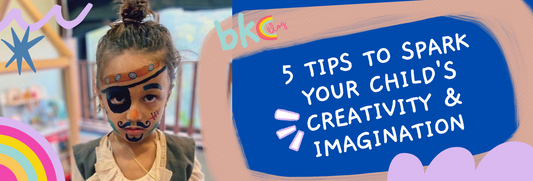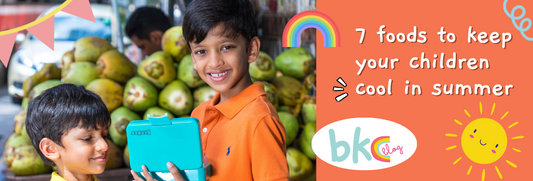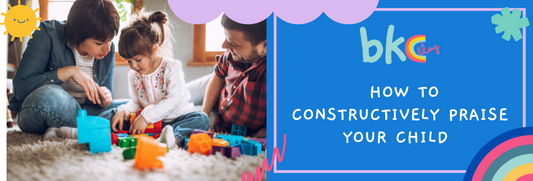Can you teach your child to be happy? Research shows you can! In fact, starting early is important because it gives them higher chances of growing up to be happy and content adults

What parent doesn't want to raise a happy child who goes on to be a happy, well-adjusted adult? But how much control do parents really have over their child's happiness? Not surprisingly, a lot of research has gone into this. And the research shows that there are certain methods and tools that can be taught to young children to shape their outlook on life as they grow into adults.
1. Cultivating Emotional Resilience
While it is the natural instinct of any parent to console their child when they're upset, or even distract them by handing them a treat, it would actually be more helpful to encourage them to feel and express their emotions and guide them through the process.
As contrary as this may sound, don't force your child to brush off their sadness and 'be happy'. Give them space to express their emotions, and handhold them as they process their feelings of sadness, anger, or frustration. If you're struggling for ways to initiate difficult topics around emotions, try using flashcards to help your child put their feelings into words and guide your conversations. For a holistic guide on understanding mental health for young children, explore Looking After Your Mental Health.
At the same time, support a mindset that looks at optimism in the long-term. Help them view setbacks or challenges not as a permanent situation but a transient one. Every setback can become an opportunity to assess what could be done differently and become a chance to learn and grow, but this would only be effective after they have had the opportunity to express, process, and reflect on their feelings.
2. Building a “Growth” Mindset
We live in a world where children grow up watching people do amazing feats in 15-30 second videos. What they are seeing is a mere glimpse of the result, without understanding the process. It wouldn't be misplaced for a child to imagine these people possessed some extraordinary degree of talent. It would also be easy to understand why a child might feel dejected if they can't replicate the same without years of hard work.

The ‘instant gratification’ mindset propagated by social media can damage self-confidence
Even in classrooms and everyday situations it is common to congratulate anyone for a particular result they have obtained – whether it is the grade a child earns for a school project or their performance at dance recitals. Instead of praising their talent or the result, research shows there is more value if you praise the effort your child has put into working on that project or the hours they have spent practising for the recital. This will do two things: It will help them learn to enjoy the process and value the effort they put into anything, and it will also allow them space for failure.
Focusing only on success or reaching a goal can lead to feelings of anxiety and dejection. They will be prone to giving up easily if they cannot obtain the 'glory' of summiting a goal. By teaching them to appreciate the process, you will help create a growth or progress-based mindset, which will teach them valuable life lessons about hard work, patience, and persistence.
3. Learning to Find Fulfilment
When we think of happiness, most of us tend to think about transient things that bring us momentary happiness, such as buying your child the latest PlayStation or treating them to an ice-cream when they're upset. But in truth, happiness is more about cultivating daily habits and mindsets rather than momentary pleasure or instant gratification.

Activities like learning an instrument or a new language can be challenging yet greatly rewarding
While positive experiences, such as a lovely family outing at an amusement park, are necessary in a child's life, lasting happiness comes from finding fulfilment through engaging activities. Help your child explore hobbies or activities that are within their ability so as not to become frustrating or demoralising, but also challenging enough to feel rewarding.
Nourishing these interests will strengthen their patience, resilience, and focus. The activity itself may not elicit any strong emotion, but ideally should be one that fully immerses the child. Even chores can be aligned to reflect the child's personal strengths, such that they find gratification simply through engaging in the activity. This will help your child build a healthy sense of self-esteem and self-worth.
Practising art therapy, such as moodles, doodles, drawings, and painting, can help your child express what they're feeling, process them, and emerge with feelings of joy and fulfilment – all the while engaging in an artistic pursuit. (Both the Moodles Series and the Unworry Series are great resources for the same.) Spending time with engaging and gratifying activities is one research-proven way parents can set their child up for a meaningful life of joy.
4. Establishing Stability Through Healthy Habits
This one may not be a favourite with your child but the science is out there! Having enough self-discipline to be able to maintain stable routines will come in handy all their lives. Simple factors like regular mealtimes and sleeptimes, along with sufficient and routine exercise and extracurriculars, will teach your child how to maintain healthy habits for life.
And while they may not always appreciate its value now, research shows that self-discipline allows for better learning and information processing. In the long run, it also helps children manage feelings of frustration, stress, and anxiety better. Having habits that require discipline and patience will subliminally teach your child that it takes time to get results for any meaningful pursuit in life. In a world of instant gratification, they will absorb the invaluable lesson of delayed gratification.
5. Learning Empathy Through Social Connections
It may seem obvious, but social connections – that is, relationships with family members, friends, neighbours, caregivers, and even pets – go a long way towards ensuring a child's mental well-being.
There is statistical evidence that when children feel loved and wanted unconditionally, they are able to regulate their emotions better and are less likely to indulge in damaging behaviours like smoking, drinking, or doing drugs. Such children are also likely to form more meaningful friendships, which in itself has a positive impact on their overall happiness.
How can you help your child build quality social connections? The foundation begins at home. As a parent, empathy and responsiveness is key. With infants and toddlers, this translates to plenty of physical contact, responding promptly to cries, and lots of time spent eating, reading, and playing together.
If possible, allow your child to spend plenty of time with loving grandparents, aunts, uncles, and cousins. Create plenty of opportunities for your little ones to interact with others their age through structured play. Meeting and interacting with the same set of children again and again will allow even younger children to learn the basics of friendship.

An excerpt from The Crayons’ Book of Feelings. Helping a child get in touch with and understand emotions is a great way to build empathy
As your child is exposed to new relationships, he or she will face lots of new feelings and emotions. Name these emotions for your little one and talk about them. Story books such as The Crayons’ Book of Feelings will help little kids learn to identify their feelings in a fun and interactive way, showing them how to deal with conflict positively as well as build emotional intelligence.
6. Practising Gratitude
Psychological studies have shown that gratitude, or thankfulness, is directly linked to one's overall emotional well-being. It allows people to “feel more positive emotions, relish good experiences, improve their health, deal with adversity, and build strong relationships.” And what's even better is that it is entirely possible to inculcate gratitude.
The idea is to make thankfulness a habit – turn it into something that you and your little one can practice together every single day. One way to do this is around the table at mealtime, with each member of the family saying out loud one thing that they feel grateful for. You can also do this with your kid at bedtime to wrap-up the day on a positive note. Another method is to encourage your child to write a thank you letter to someone who has made a difference to them.
For older children (as well as adults), keeping a gratitude journal is known to be highly effective. At the end of each day, encourage your kid to spend a few minutes noting down all the positive things that transpired during the day in a dedicated notebook. Alternatively, you can pick a gratitude journal such as this one, which contains ready writing prompts as well as stickers that help make the whole exercise super fun. For teens and up, you could try journals such as You Are the Magic You Seek - A Journal for Looking Within, which contains writing prompts as well as lots of beautifully illustrated affirmations.
Studies show that happy kids go on to become successful adults in all spheres of life. It is true that some aspects of a child's emotional disposition are genetic. But it is completely within our hands to equip our children with the tools they need to explore and navigate the world confidently. A little mindfulness on our parts as parents is all it takes.





